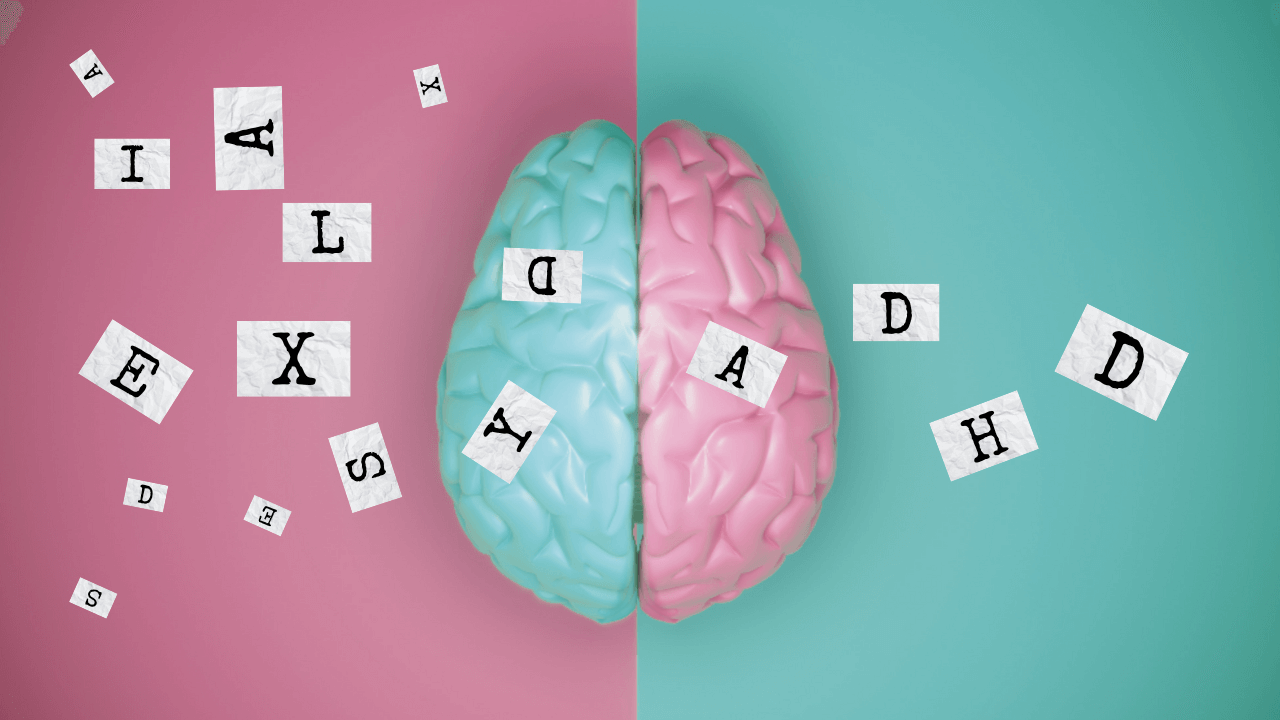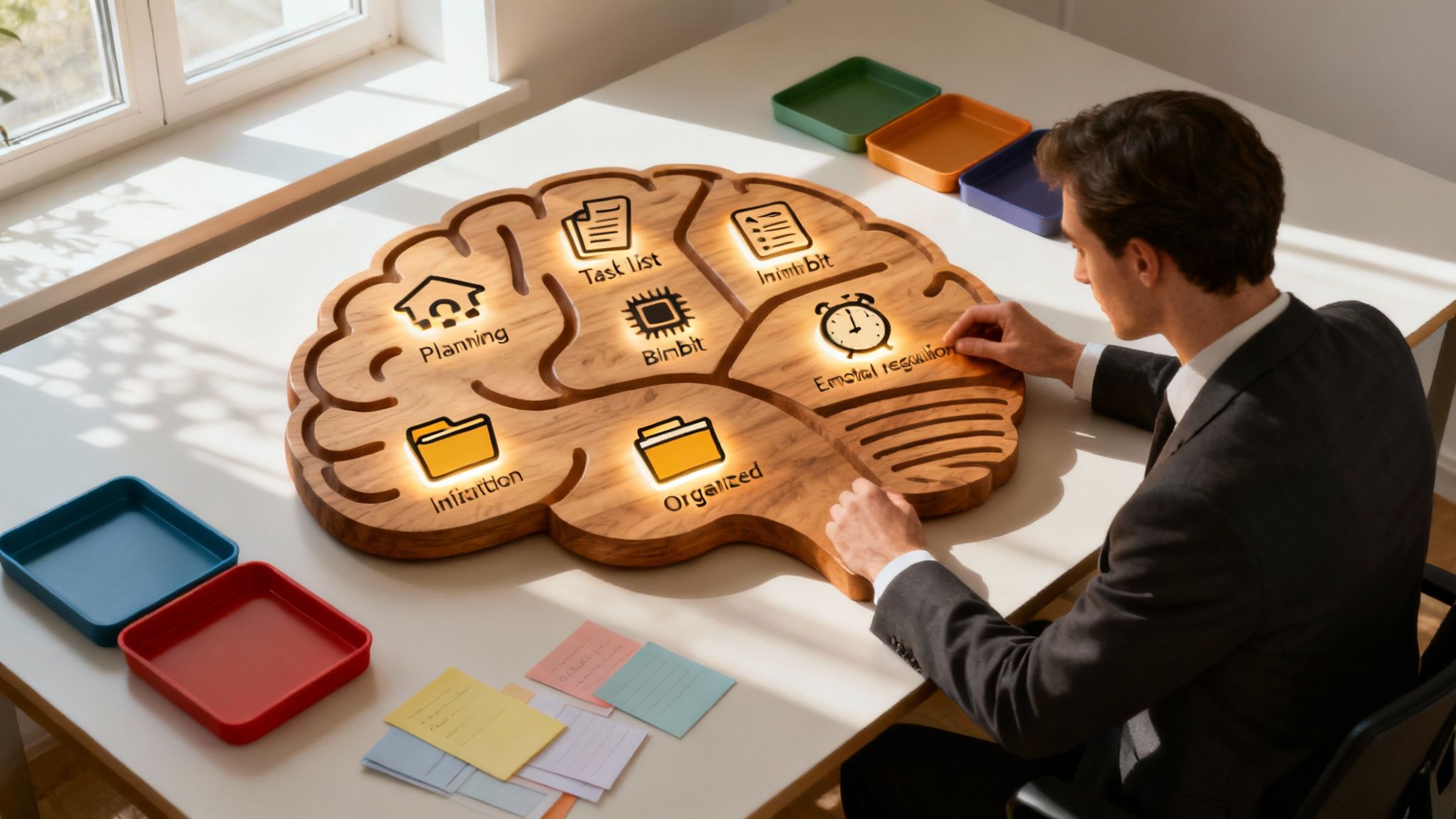ADHD symptoms can lead to difficulties with learning, which may explain why it is frequently mislabeled as a learning disability.
Dyslexia, on the other hand, is a learning disability affecting reading, writing, and spelling ability. It's the most common learning disability, with approximately 20% of Americans having dyslexia. In addition, up to 40% of individuals with ADHD may also have dyslexia.1
In this article, we will explore both the similarities and differences between ADHD and dyslexia.
Too long; didn't read
- Dyslexia is a learning disability; ADHD is not.
- Often, people with dyslexia have ADHD and vice versa.
- ADHD and dyslexia present similar challenges with communication, math, and self-esteem.
- ADHD and dyslexia can both lead to attention difficulties and struggles with reading and writing.
ADHD vs. dyslexia
The basics of ADHD
Attention-deficit hyperactivity disorder (ADHD) is a neurodevelopmental condition that exhibits symptoms that fall into the following categories:
- Inattention
- Hyperactivity
- Impulsivity
- Disorganization
- Limited executive functioning capacity
The basics of dyslexia
Dyslexia is a learning disability resulting in reading struggles and issues linking speech sounds to letters and words.
Because ADHD affects attention and dyslexia affects reading fluency, the lines between the two can blur.
How are ADHD and dyslexia similar?
Struggling with social skills
Research has shown that people with dyslexia may experience delayed speech development, which can lead to difficulties in communicating effectively.
People with ADHD can also struggle with communication due to impulsivity, inattention, and hyperactivity, affecting their ability to express themselves appropriately.
Math is harder for them.
For people with dyslexia, math can present a unique challenge because, like letters, numbers can get mixed up. This can make it difficult to understand math concepts and solve problems accurately.
Math can also be an obstacle for ADHDers. Research has shown that up to 60% of individuals with ADHD are also diagnosed with a learning disability called dyscalculia or math dyslexia, which complicates their ability to comprehend mathematical concepts, remember formulas, and solve problems, often resulting in frustration and anxiety.2
Low confidence and self-esteem
Difficulties with reading can have a profound impact on a person's confidence, regardless of their age.
People with dyslexia may lack confidence when they struggle to read and comprehend written information.
ADHD symptoms can lead to low self-esteem due to challenges they may face when interacting with authority figures constantly trying to "correct" their behavior. The constant need for redirection and correction can lead to feelings of frustration and shame.
How are ADHD and dyslexia different?
While the above similarities connect dyslexia and ADHD, it is also helpful to understand their differences.
Easily distracted, but for different reasons
While dyslexia and ADHD can result in distractibility, the source of distraction differs between the two conditions. For those with dyslexia, the need to focus intensely on reading can lead to distraction, making it difficult to concentrate on other tasks.3
In contrast, ADHD-related distraction stems from the inattentive trait, which interferes with focus.
Reading difficulties
Reading is a shared struggle for those with ADHD and dyslexia, but for different reasons. Not everyone with ADHD finds reading challenging, but it can be experienced due to the inability to focus at times.
The struggle to read for those with dyslexia is not due to focus but rather their brain's way of processing language.
Trouble with writing
For people with dyslexia, writing can be difficult due to spelling, grammar, and sentence structure issues. As a result, these individuals may struggle to put their thoughts into words, leading to frustration and a lack of confidence in their writing abilities.
Similarly, ADHDers may find writing challenging due to problems with organization, structuring sentences, and proofreading.4 In addition, the impulsivity and distractibility associated with ADHD can make it hard to stay focused while writing, often leading to a disorganized and confusing final product.
A person with dyslexia struggles with many things related to writing:5
- Spelling
- Gramma
- Proofreading
- Organization
- Vocabulary
- Handwriting
How to deal with dyslexia and ADHD
While medication is often an effective treatment option for children and adults with ADHD, it's not usually recommended for people with dyslexia alone. To help manage the symptoms associated with ADHD and dyslexia, here are some strategies to explore.
Find therapy and support networks
Dealing with the emotional impact of ADHD and dyslexia can take a toll, but therapy can provide tools and coping mechanisms when it feels particularly overwhelming. A trained therapist can help individuals build self-esteem, manage symptoms, and improve their well-being.
Additionally, support groups and peer networks might offer a sense of community and understanding, allowing ADHDers and people with dyslexia to connect with others going through similar struggles.
Practice reading tasks
People with ADHD and dyslexia can benefit from reading tasks that help make reading less of a challenge.
Reading tasks include:
- Working with a reading specialist
- Using technology as an aid (such as spelling and grammar check programs)
- Using a bookmark to help focus on reading
- Requesting extra time for tasks that involve reading and writing
- Read in an environment that is quiet and relaxed
Use focus sessions
Carving out specific times to focus can help an ADHDer or a person with dyslexia cut out other distractions for a set amount of time.
Ways to make the most of your focus sessions:
- Break down tasks into more digestible pieces
- Use timers to combat time blindness
- Incorporate calendars to organize
- Set up a routine
- Focus on getting enough sleep and exercise
👉 You try it! Check out our focus sessions in the Inflow app. Take our free ADHD quiz here!
Final thoughts
In conclusion, dyslexia and ADHD can present various challenges, particularly in reading and writing tasks. However, with the right support and accommodations, people with dyslexia and/or ADHD can develop helpful coping strategies and build skills to help them thrive academically and in their careers.
-
Sources
1 Journal of Neurodevelopmental Disorders | Are there shared neural correlates between dyslexia and ADHD? A meta-analysis of voxel-based morphometry studies
2 PLoS ONE | Children with ADHD Symptoms Have a Higher Risk for Reading, Spelling and Math Difficulties in the GINIplus and LISAplus Cohort Studies
3 Clinical Ophthalmology | Developmental Dyslexia and Vision
4 Developmental Disabilities | The written expression abilities of adolescents with Attention-Deficit/Hyperactivity Disorder
5 Language, Speech, and Hearing Services in Schools | Why Children With Dyslexia Struggle With Writing and How to Help Them








